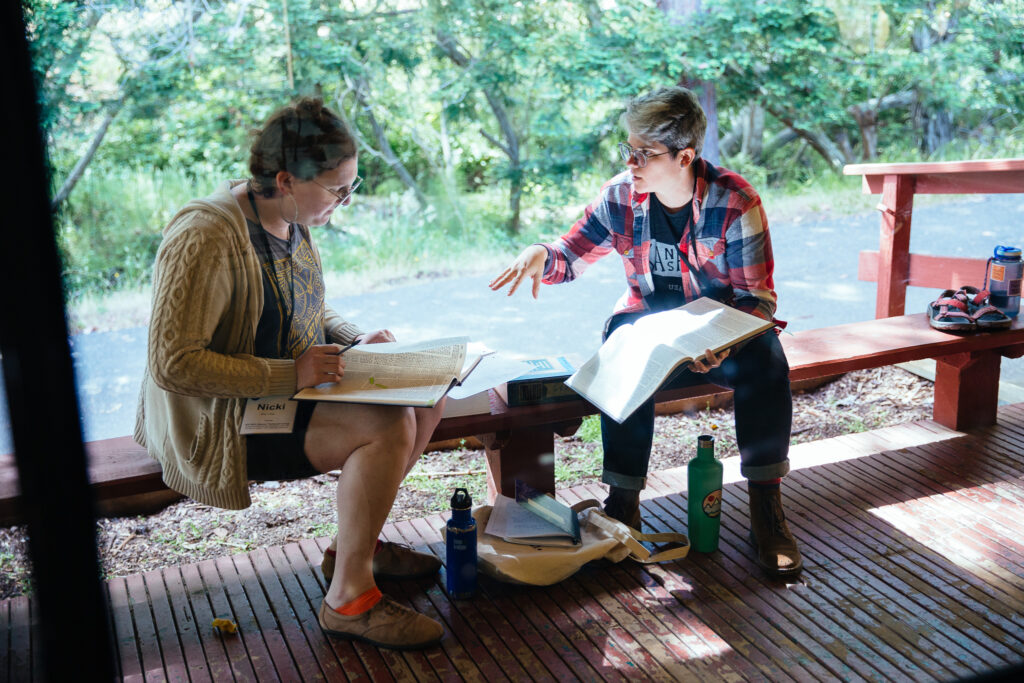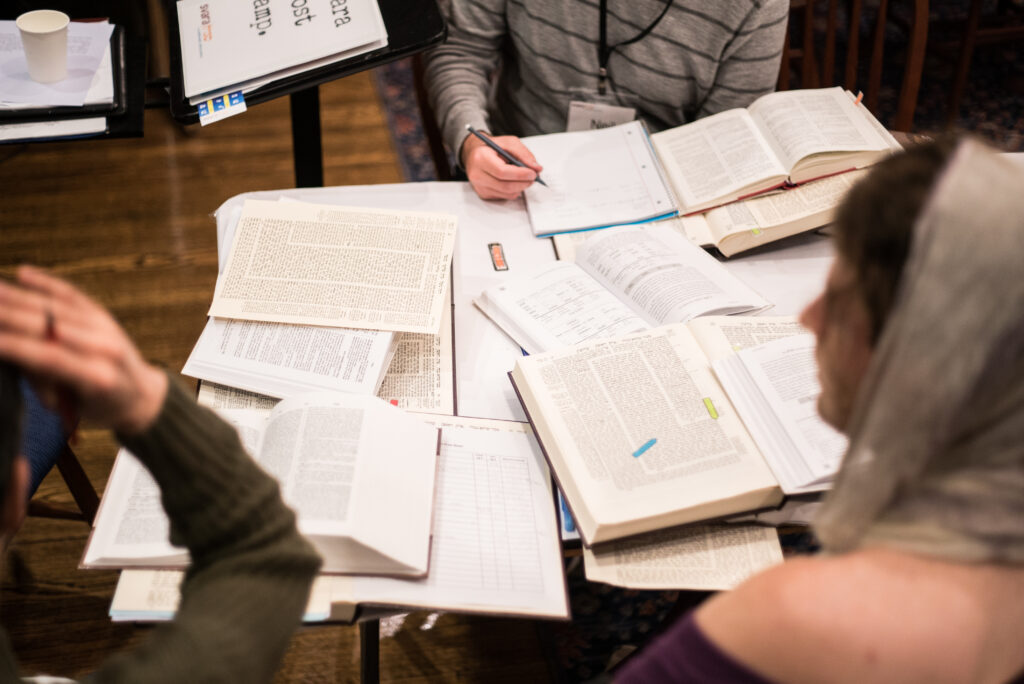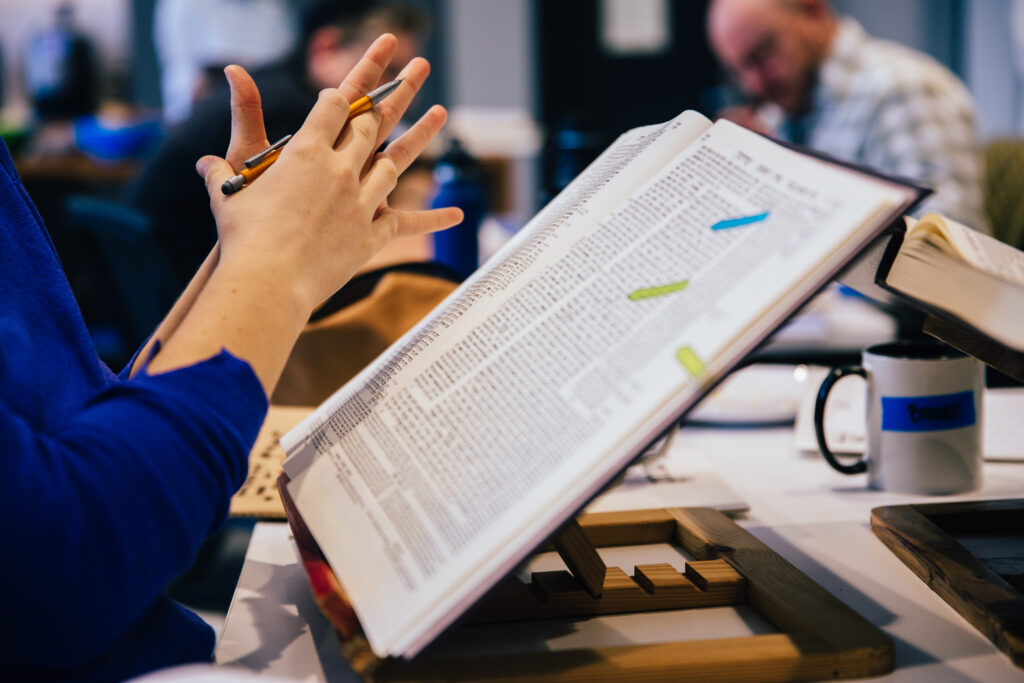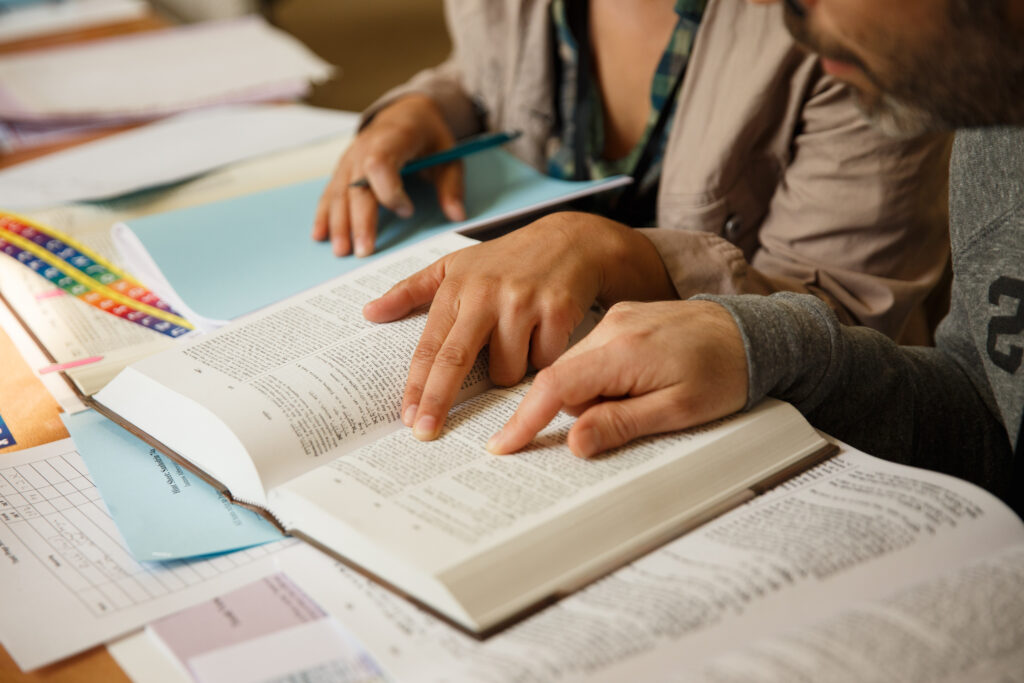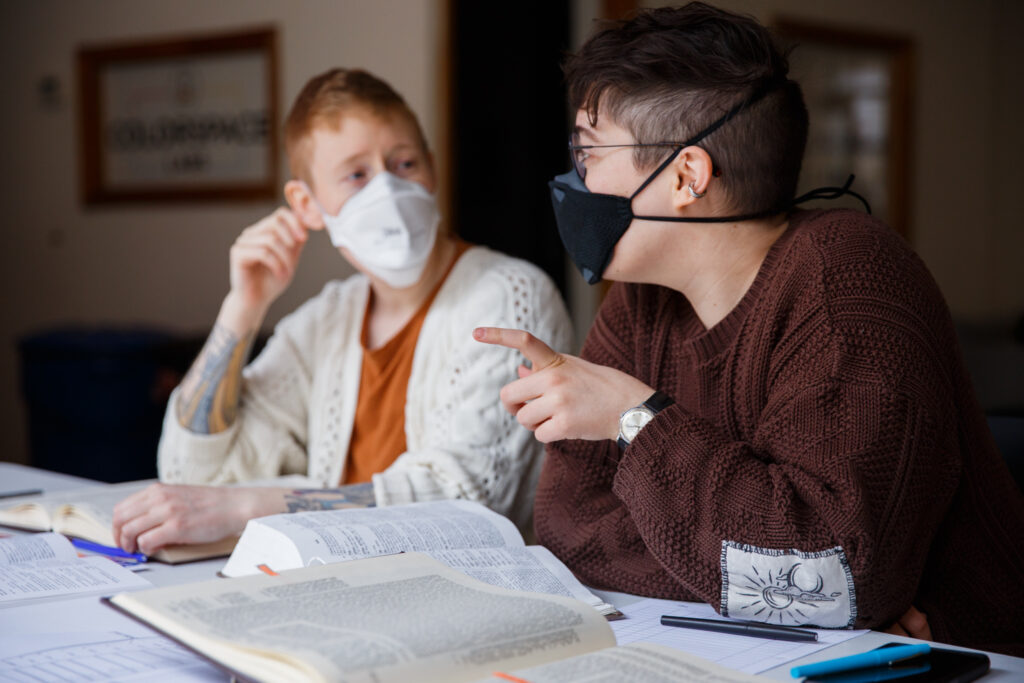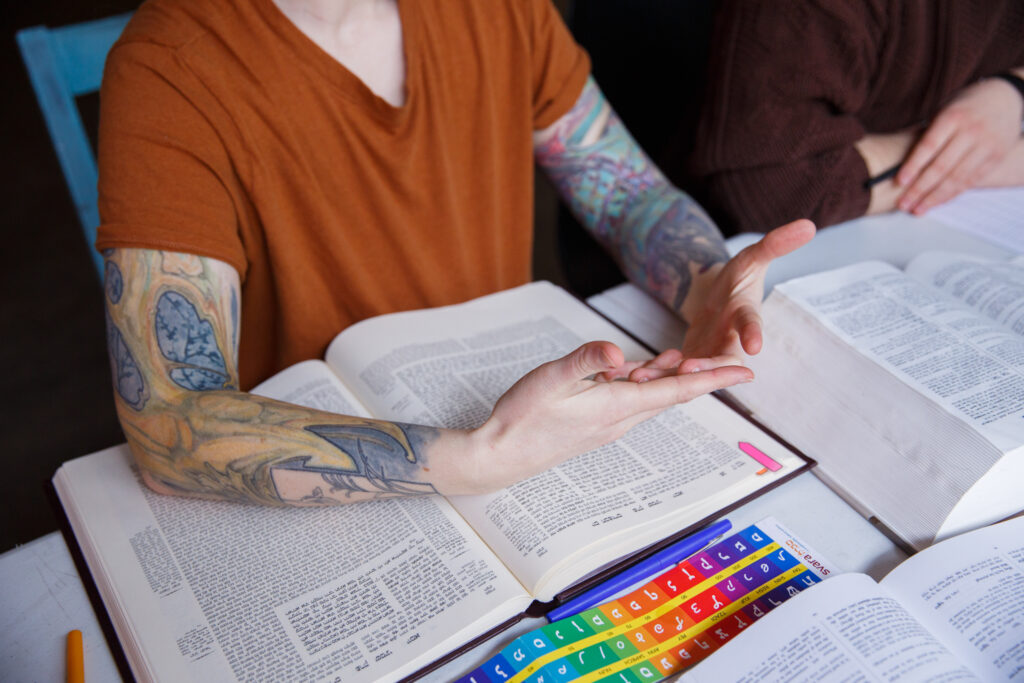Do you have a movie that you rewatch again and again just for the pleasure of it? You know how it starts, you know the twists and turns in the middle, you definitely know the ending, and you still laugh or cry exactly the same way you did as if it was the first time you’d experienced it? Anyone who knows me knows that movie for me is “Yentl” but you may be shocked that there are some pieces of Talmud that are like that for me too. Actually, that totally tracks. Except that with the Talmud you never really know how it ends. I mean, you think you do, except that the whole purpose of Talmud is that it keeps going and going through us. In that way, revisiting a sugya of Talmud is always like watching a new version of the movie you thought you knew. And as it turns out, when you come to look at it again, it’s like you’ve never seen it before.
That’s how I’m feeling this zman as I’m coming back to teach one of SVARA’s favorite sugyot entitled “Harmful Speech” or “Ona’at Devarim” (אונאת דברים) / “Verbal Mistreatment”, for the 3rd time. Because we’re still in the middle of the zman I won’t be giving away any of the conclusions of this sugya (that’s right, no spoiler alerts SVARAniks!) but this sugya has become one of my personal favorites. It charges us as human beings to really think about the creative and destructive power of speech. As a theater-maker I’ve often been hyper-aware of the conscious effort one takes to create a world with words, but this sugya comes to remind us that we must stay vigilant about the ways our words become complicit with the harmful systems of the world we inhabit.
Well, I should say, at least that was what I thought this sugya was about. This time around I noticed something I hadn’t noticed before. This sugya is connected by only a few lines to another long-time favorite sugya of mine known as “The Oven of Akhnai” (for friends following along, we’re looking at Bava Metzia 58b-59a/b). “The Oven of Akhnai” is a famous piece of Aggadah (legendary material) that tells of a disagreement between Rabbi Eliezer ben Hyrcanus and the sages over the purity of a newly invented oven constructed from coiled layers of earthenware separated by layers of sand (some scholars believe this to be the beginning of the use of glass, particularly Roman glass, in ovens). Rabbi Eliezer believes that the oven is ritually pure (that it doesn’t contaminate between its layers when cooking different kinds of foods) whereas the rabbis deem it impure. Rabbi Eliezer goes to the extent of answering every possible question in the world that would challenge his opinion and he proves that his opinion is correct, but nonetheless, the rabbis rule against him. At this point, a series of miraculous events occur:
Rabbi Eliezer said to them: If the halakha (הלכה, law / practice / custom) is like me (i.e.- my opinion) this carob tree will prove it. The carob tree was uprooted from its place one hundred cubits, and some say four hundred cubits. They (the rabbis) said to him: One does not cite proof from the carob tree. He then said to them: If the halakha is like me, the stream will prove it. The stream turned backward (i.e.-began flowing in the opposite direction). They said to him: One does not cite proof from a stream. He then said to them: If the halakha is like me, the walls of the study hall will prove it. The walls of the study hall leaned [as if] to fall. Rabbi Yehoshua scolded [the walls] and said to them: If Torah scholars are contending with each other regarding halakha, what good is it to you to fall? Hence the walls did not fall because of the honor of Rabbi Yehoshua, but they did not straighten because of the honor of Rabbi Eliezer, and they still remain leaning. He [Rabbi Eliezer] then said to them: If the halakha is like me, Heaven will prove it. A Divine Voice emerged and said: Why are you going against Rabbi Eliezer, as the halakha is like him in every place (i.e.- in all of these proofs which he has offered re: the Oven of Akhnai)? Rabbi Yehoshua stood on his feet and said: “It is not in heaven” (Deuteronomy 30:12). [The Gemara asks]: What is [the meaning of] “It is not in heaven”? Rabbi Yirmeya says: The Torah was already given at Mount Sinai– we do not regard a Divine Voice, as You already wrote at Mount Sinai, in the Torah: “You shall follow after the majority” (Exodus 23:2).
Now some folx may know the famous conclusion of this sugya where G!D laughs, saying “my children have defeated me, my children have defeated me!” and we all, in turn, have a good laugh at the fact that our queer rabbi ancestors created a system where our human debates have even more “divine power” than The Divine Themself! So Jewish, right? Except this sugya doesn’t end on such a laughing matter. There’s actually something a little more sinister and cynical going on—the first issue begins with our ancestors’ pretty drastic manipulation of a Torah verse. Here’s the complete version of Exodus 23:2:
לֹֽא־תִהְיֶ֥ה אַחֲרֵֽי־רַבִּ֖ים לְרָעֹ֑ת וְלֹא־תַעֲנֶ֣ה עַל־רִ֗ב לִנְטֹ֛ת אַחֲרֵ֥י רַבִּ֖ים לְהַטֹּֽת׃
You shall not follow after the many (i.e.-side with the majority) to do wrong—you shall not give perverse testimony in a dispute so as to pervert it in favor of the majority
Our rabbinic ancestors deliberately misquoted a Torah verse to justify their actions in silencing Rabbi Eliezer! Now you might respond, saying—“wait, I thought part of the queering project of the Talmud was that our rabbinic ancestors gave us a blueprint for and permission to play creatively with Torah verses in order that we can act upon the dynamic relationship between Torah and our lived experience and wisdom (our svara סברא) today!” Fair point, except that here in this sugya we see that sometimes the way we play with our words can actually lead to serious harm. As this sugya continues, we find out that the rabbis overturn everything that Rabbi Eliezer has deemed pure that was cooked in that oven but not only that, they decide to ostracize him, kicking him out of the beit midrash. Realizing how painful this information will be to Rabbi Eliezer, his beloved disciple Rabbi Akivah volunteers to be the one to tell Rabbi Eliezer of this news, lest his tears and rage will be so great “that it will destroy the entire world.”
What a moment—why don’t the rabbis think to themselves, “if the thing we’re about to tell Rabbi Eliezer could make him so upset that his tears and rage might destroy the entire world, maybe we should reconsider doing this to him?!?” Well, they don’t think that to themselves, because they are operating under a principle which they believe is actually about their own empowerment, that they have the right to follow after the majority, and the majority agrees that Rabbi Eliezer has lost his touch with what is pure and what is impure and therefore he should no longer hold authority in the beit midrash. And what ensues? Rabbi Eliezer is so pained by the news of his ostracism that he tears his clothes in mourning, sits on the ground and weeps, and the ancestors say that a third of all the olives, wheat and barley, core crops, were destroyed in that day. Not only that, but they said that even the dough in the women’s hands would spoil, and every place that Rabbi Eliezer’s gaze would touch would burn.
The sugya continues with yet another terrible tragedy that ensues from these cruel words spoken to Rabbi Eliezer by his peers—the death of Rabban Gamliel which is mysteriously brought on by the pain suffered by Rabbi Eliezer. Rabban Gamliel’s sister, Imma Shalom, then says the following which brings this sugya to a close:
כל השערים ננעלים חוץ משערי אונאה
All the gates of Heaven are locked, except for the gates of prayer for victims of (verbal) mistreatment.
Never before had I realized that “The Oven of Akhnai” was actually addressing this issue of verbal mistreatment. Yes, it also contains a powerful declaration of our very queer rabbinic independence from “ultimate authority” (take that, G!D3SS! j/k we’re cool J ) but in the act of declaring that independence, our rabbinic ancestors end up deeply hurting one of their queer rabbinic family. In the end, I was left with a totally new perspective on this “Harmful Speech” sugya that had never occurred before—originally, I was convinced that this sugya was dealing with the ways that speech can be harmful in the outside world—i.e. that painful, frightening world outside our glittery-queer-Talmud-beit-midrash-safe-space-taste of the World-to-Come-realness that our ancestors built and that we at SVARA are humbled to be a part of the continuation of. But now I’m realizing that “Harmful Speech” and “Oven of Akhnai” are actually together part of a larger concept about the ways in which oppressive modalities of speech can affect every area of life, in the spaces we consider to be the most sacred. All that is to say our ancestors were clearly less naïve than I was—they knew that even in the most radical spaces, even the ones they themselves were creating, there were still practices of harm that were infiltrating. So, what do we do?
This is why one of the things I respect the most about SVARA is the practice of communicating community norms whenever we start a new class, of creating multiple avenues for students, faculty, staff, etc. to report back harm. Maybe it’s not the most exciting thing that we do, but then again, I can think of so many times in my life when I’ve been in a queer or politically radical space and experienced harm but doubted myself, or was gaslit by others, to believe that harm couldn’t take place in those spaces because these are “the good spaces”, not like those [fill in the blank] spaces in the rest of the world. What I’ve learned this time around from re-visiting these sugyot is that we are the world in the beit midrash, and perhaps the holiest most queering thing we can do in this life is to begin the ongoing practice of making the world a better place by looking at our batei midrash as their own little worlds where we can dismantle practices of verbal harm. May it be that every time we enter a beit midrash at SVARA that we are both daring and radical in our reclamation of our tradition, and disciplined and committed to the practice of building better and more healed worlds. <3

